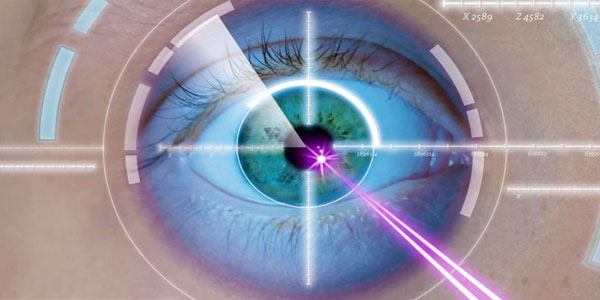
Novel method could improve LASIK eye surgery
Team Udayavani, Mar 13, 2019, 9:30 AM IST

Washington: Scientists have developed a new microscopy technique that could one day be used to improve laser vision correction, LASIK, and eliminate the “surgery” aspect of the procedure.
When performed on both eyes, the entire procedure of LASIK surgery takes about 20 minutes and can rid patients of the need to wear glasses or contact lenses.
While LASIK has a very high success rate, virtually every procedure involves an element of guesswork, according to the study published in the journal Physical Review Letters.
This is because doctors have no way to precisely measure the refractive properties of the eye.
Instead, they rely heavily on approximations that correlate with the patient’s vision acuity — how close to 20/20 he or she can see without the aid of glasses or contacts.
Giuliano Scarcelli, an assistant professor with the University of Maryland in the US developed a microscopy technique that could allow doctors to perform LASIK using precise measurements of how the eye focuses light, instead of approximations.
“This could represent a tremendous first for LASIK and other refractive procedures,” Scarcelli said in a statement.
“Light is focused by the eye’s cornea because of its shape and what is known as its refractive index. But until now, we could only measure its shape. Thus, today’s refractive procedures rely solely on observed changes to the cornea, and they are not always accurate,” said Scarcelli.
The cornea — the outermost layer of the eye — functions like a window that controls and focuses light that enters the eye. When light strikes the cornea, it is bent — or refracted.
The lens then fine-tunes the light’s path to produce a sharp image onto the retina, which converts the light into electrical impulses that are interpreted by the brain as images.
Common vision problems, such as nearsightedness or farsightedness, are caused by the eye’s inability to sharply focus an image onto the retina.
To fix this, LASIK surgeons use lasers to alter the shape of the cornea and change its focal point. But, they do this without any ability to precisely measure how much the path of light is bent when it enters the cornea.
To measure the path light takes, one needs to measure a quantity known as the refractive index; it represents the ratio of the velocity of light in a vacuum to its velocity in a particular material.
By mapping the distribution and variations of the local refractive index within the eye, doctors would know the precise degree of corneal refraction.
Equipped with this information, they could better tailor the LASIK procedure such that, rather than improved vision, patients could expect to walk away with perfect vision — or vision that tops 20/20.
Even more, doctors might no longer need to cut into the cornea.
“Non-ablative technologies are already being developed to change the refractive index of the cornea, locally, using a laser,” Scarcelli said.
“Providing local refractive index measurements will be critical for their success,” Scarcelli said.
Researchers developed a microscopy technique that can measure the local refractive index using Brillouin spectroscopy — a light-scattering technology that was previously used to sense the mechanical properties of tissue and cells without disrupting or destroying either.
“We experimentally demonstrated that, by using a dual Brillouin scattering technology, we could determine the refractive index directly, while achieving three-dimensional spatial resolution,” Scarcelli said.
“This means that we could measure the refractive index of cells and tissue at locations in the body — such as the eyes — that can only be accessed from one side,” he said.
Udayavani is now on Telegram. Click here to join our channel and stay updated with the latest news.
Top News

Related Articles More

Drinking tea, coffee linked to lower risk of head and neck cancer: Study

Study shows how brain chemicals control eating, could help develop improved obesity drugs

‘Faster walkers’ had significantly lower risk of diabetes, hypertension: Study

World Meditation Day 2024: Celebrating inner peace and well-being

Virus causing gut infections could play role in development of Alzheimer’s: Study
MUST WATCH
Latest Additions

Digital payment system to be implemented from April 1 to prevent stamp paper fraud?

‘My mother-in-law must die soon’ message found on note in temple hundi

Kasaragod: Prime suspect arrested in Rs 50 lakh ATM cash van robbery case

Chhetri farewell signals end of an era in forgettable year for Indian football

Coastal Development Authority to be Karavali Development Board from next financial year
Thanks for visiting Udayavani
You seem to have an Ad Blocker on.
To continue reading, please turn it off or whitelist Udayavani.






















